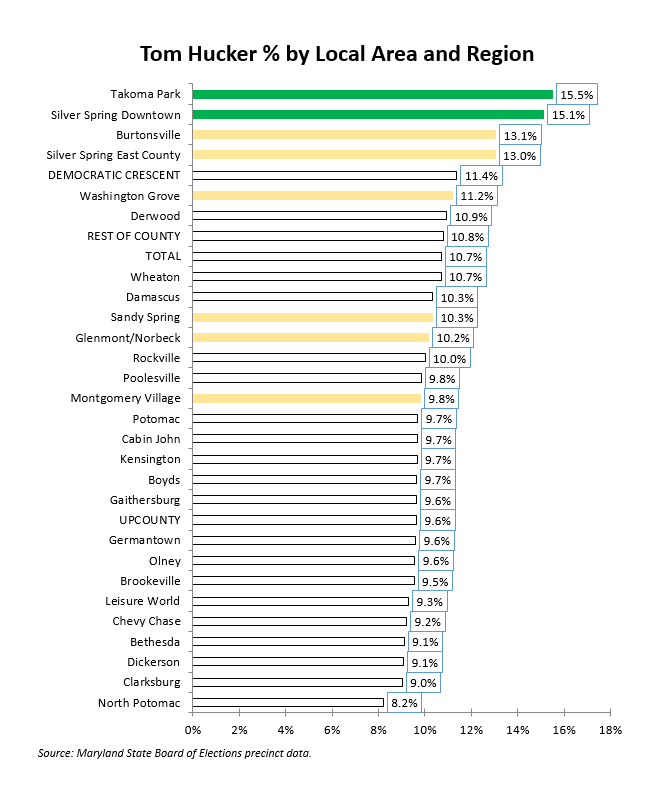By Adam Pagnucco.
It’s going to be strange to see MoCo politics without Tom Hucker in the middle of it. Hucker has been a player in the county since he founded Progressive Montgomery in the 1990s, which he later expanded into Progressive Maryland. In 2006, he won a House seat in District 20 and went on to become one of the left’s most reliable and effective delegates. Eight years later, Hucker won a tight race over Evan Glass to claim the Council District 5 seat. In all of these roles, Hucker was the same guy: Mr. Progressive.
Then came this cycle. For the first time ever, I saw Hucker do something that seemed totally irrational – he entered the race for county executive. (I was working for David Blair at the time.) Why give up a safe council district seat to run against an incumbent and two other opponents who had both run countywide before? I did not get it and I still don’t. Evidently, Hucker came to agree with me as he dropped down to the council at-large race on the day of the filing deadline.
Hucker brought a number of assets to his run for council at-large. First, he had won as many elections – four – as his opponents combined. Second, his old council district, which contained Silver Spring Downtown, Takoma Park and the Route 29 corridor, was a nice starting base full of votes and more than a bit of money. Third, his fundraising for the cycle of $639,502 easily led the field. And finally, while progressive groups were not going to support him against Marc Elrich, some of them lined up with him in the council at-large race, including MCGEO, the Sierra Club, the local AFL-CIO, Progressive Maryland and the career and volunteer fire fighters. The realtors and the developer group Progressives for Progress also supported him.
Ultimately, Hucker’s switch outside of his district turned into a disaster as he finished sixth. Because his shift into the council at-large race occurred at the last minute, some organizations – notably including MCEA, SEIU and Casa in Action – had already endorsed in the race. Brandy Brooks’s staff scandal caused some groups to drop her, but Hucker did not benefit as MCEA picked up Gabe Albornoz and Casa picked up Laurie-Anne Sayles. Hucker lacked both the Apple Ballot and the Post endorsement, two tools that would have been valuable in spreading his name outside his district.
Also, while Hucker raised a ton of money, he spent most of it while running for executive. In his pre-primary 1 report, he reported two measures of cash balance – one for $126,517 and another for $89,412. Let’s remember that he raised more than $600k for the cycle. When Hucker needed big money for a late countywide push, most of it was gone.
The chart below shows Hucker’s vote percentage by local area and region. Bars in green show a ranking of 3rd, bars in yellow show a ranking of 5th and bars in white show a ranking of 6th or lower.

Takoma Park and Silver Spring Downtown turned out to be the only areas where Hucker had a strong base. He finished third in each of them behind Will Jawando and Glass (his 2014 opponent in Council District 5). On the other hand, he finished sixth in Bethesda, Boyds, Brookeville, Cabin John, Chevy Chase, Damascus, Derwood, Dickerson, Gaithersburg, Germantown, Kensington, Leisure World, North Potomac, Olney, Poolesville, Potomac, Rockville and Wheaton and finished seventh (behind Brandy Brooks) in Clarksburg.
The chart below shows how Hucker did in the county’s racially concentrated precincts. (See my methodology post for definitions.) Bars in yellow show a ranking of 5th and bars in white show a ranking of 6th.

Hucker finished fifth in the heavily Black and Latino precincts and he finished sixth in the heavily White and Asian precincts. It’s worth noting that a majority of the Black precincts are located in Hucker’s old council district.
Despite the above, Hucker can still make a comeback. A seat might open up in District 20, his old state legislative district. He might be able to win an open council at-large seat next time, especially if there are multiple seats available. A race against Kate Stewart for his reconfigured council seat might be an option although Stewart doesn’t seem to be particularly weak and would be stronger as an incumbent. Another option is the advocacy world, which is where he came from originally. The last thing his former colleagues would enjoy is to be targeted by an advocacy campaign run by Mr. Progressive!
Knowing his history, I have a hunch that this is not the last we have seen of Tom Hucker.
